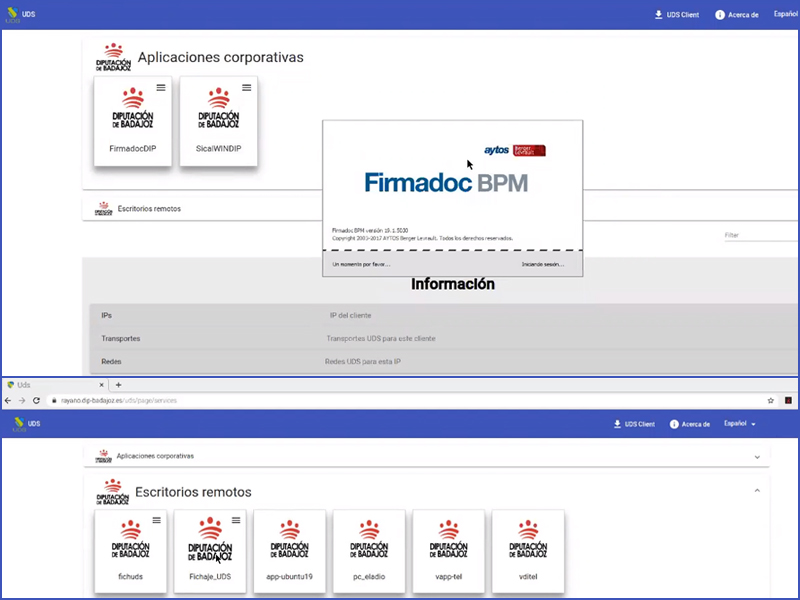Maqueda showed his remote work environment, and attendees could see how the Raspberry Pi connects to UDS Enterprise. This software is responsible, for example, for starting a virtualized application on a Windows machine hosted on a Provincial Council server. Through the application, users can access the folders on the server and on the Raspberry Pi itself. UDS Enterprise has allowed them to choose the connection protocol that they want to use. “We have tested with Free RDP and HTML5. Both options work seamlessly,” he commented.
The Systems Manager proved how simple the system with UDS Enterprise is for users. They just have to enter a URL in a web browser, type in their credentials, and click on the Windows or Linux application icon they want to open. He also discussed the possibility of publishing virtual desktops and even remote access to physical machines without the need for VPN.
In the case of virtual desktops, they have set up a Ubuntu virtual machine that incorporates an Xfce desktop. They have configured a web browser with access to the Provincial Council’s applications through an internal remote working VLAN within the said desktop. With this method, employees can use email, the employee portal, and any other application that works via the web and within the Provincial Council’s infrastructure.
They chose to serve non-persistent virtual desktops because they are easier to manage, since all administration tasks, updates, patch installation… can be performed centrally. They also have advantages in security; in the event of any issue, all they have to do is restart the virtual desktop to eliminate it since a new virtual desktop is delivered when logging in again. Neither the data nor the settings previously applied by the user are saved.
To configure both the virtual desktops and applications environment with UDS Enterprise, the Badajoz Provincial Council’s IT specialists had the help of the team that supports this software and its trusted integrator. “We appreciate the support of Virtual Cable and Quer System, they have given us all their support to put this remote working platform on going. With their assistance, we have built a highly stable platform” Maqueda said.
This innovative remote working project in public administration is in its initial phase. Throughout 2021, 200 devices will be provided for employees of the Provincial Council and City Councils of the province of Badajoz.
The IT team has already thought about taking full advantage of the possibilities offered by the compatibility between the VDI connection broker and low-cost devices. In the future, they plan to go one step further and replace conventional computers with Raspberry Pi terminals and UDS Enterprise for workstations located in the offices of the Provincial Council and City Councils.
For more information, you can view the recording of the session in Spanish at this link.
Related links:
Pioneering remote working project with UDS and Raspberry Pi
Case Study: HA vApp for 300 connected offices
Cloud VDI with UDS Enterprise at ESPOCH University in Ecuador








0 Comments